- Home
- >
hyper-brains
in the old solar system
Swollen, hypertrophied or disembodied brains - bulging with menace - are a classic plot device, beloved of the sf imagination - so you'd expect the Old Solar System to hold a wealth of examples.
Stid: Cuddly horrors, whom one loves to hate....
Zendexor: Indeed, I could have titled this page "Evil Brains", only I didn't want to sound judgemental...
Stid: Flapdoodle. We all make judgements every second of our lives - we have to.
Harlei: For once I agree with Stid. Call a spade a spade. Call an evil brain an evil brain.
evolved brains
Zendexor: Heartened by this unexpected degree of support, I shall proceed. Perhaps, for the time being, we'll leave the page-title as it is, for the sake of one exception which we'll meet later on; but meanwhile, since you're looking for evil brains, here for starters is a really super-bulgy specimen...
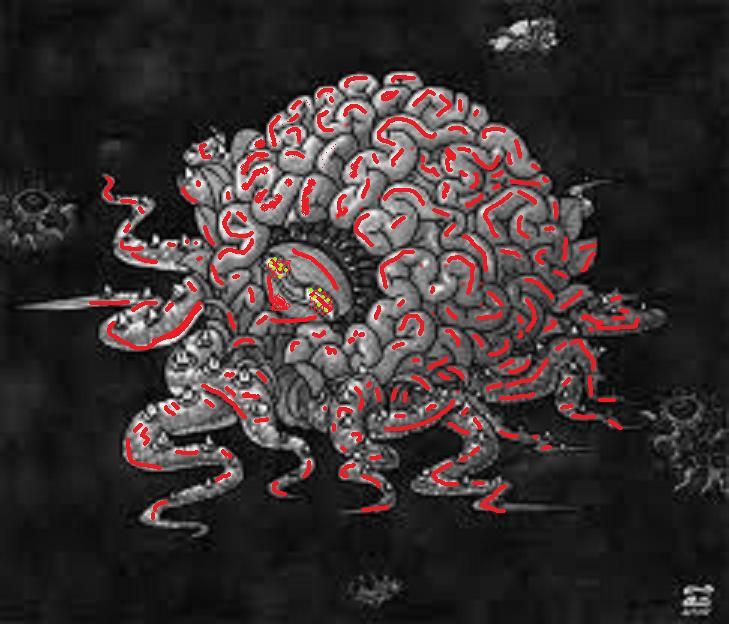
Soft, crimson mass, surrounded by weird and complex mechanisms. About it stood scores of men - or of things such as Ellis and Keening had fought. Monsters, with shining flesh translucent and grim skeletons visible.
Ellis, fighting that lingering paralysis, stared at the red mountain, and wondered. Then he saw the face of it, and understood.
The face was grotesquely and incredibly tiny, situated just above the blue floor, with quivering, wrinkled red folds bulging out above it. A thin, sharp, chinless beak, and two hideously malevolent, amazingly ancient eyes.
The eyes riveted his gaze. Two of them, protruding above the beak, at the corners of the tiny, triangular face. They were green. And compound, like the eyes of insects. Each had seven orbs. Age-old wisdom was writ cold in each septuple eye, and malign power, ruthlessly evil.
The scarlet mountain was a brain. A living brain, hypertrophied to the ultimate degree. It answered Ellis Drew's old question: it was the hideous consummation of organic evolution upon the oldest planet...
[The Plutonian Terror]
Harlei: I'm glad it's red, because I was regretting that we can't use Donald Wandrei's The Red Brain - which comes from around Antares, a long way from the Solar System...
Zendexor: Another bad egg, as I recall. Pity he was the last hope of the Universe...
Stid: I wonder if we're all being a bit too hard on the hyper-brains. Wouldn't you be rather manipulative if you were a helpless heap of grey matter, dependent on your servitors, and with nothing but your vast mental force to enforce your dominance over them?
Zendexor: You're right, Stid. No harm in showing a bit of understanding. Wells did, with his Martians - who though not as bulgy as the above Plutonian, nevertheless are further along that road than we humans are. The War of the Worlds balances horror with understanding.
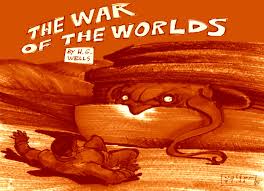
...Strange as it may seem to a human being, all the complex apparatus of digestion, which makes up the bulk of our bodies, did not exist in the Martians. They were heads, merely heads. Entrails they had none. They did not eat, much less digest. Instead, they took the fresh living blood of other creatures, and injected it into their own veins. I have myself seen this being done, as I shall mention in its place. But, squeamish as I may seem, I cannot bring myself to describe what I could not endure even to continue watching. Let it suffice, blood obtained from a still living animal, in most cases from a human being, was run directly by means of a little pipette into the recipient canal...
The bare idea of this is no doubt horribly repulsive to us, but at the same time I think that we should remember how repulsive our carnivorous habits would seem to an intelligent rabbit.
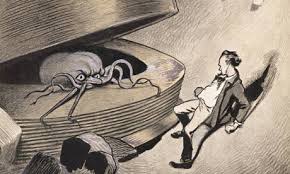
The
physiological advantages of the practice of injection are undeniable,
if one thinks of the tremendous waste of human time and energy
occasioned by eating and the digestive process. Our bodies are half
made up of glands and tubes and organs, occupied in turning
heterogeneous food into blood. The digestive processes and their
reaction upon the nervous system sap our strength, colour our minds.
Men go happy or miserable as they have healthy or unhealthy livers, or
sound gastric glands. But the Martians were lifted above all these
organic fluctuations of mood and exertion...
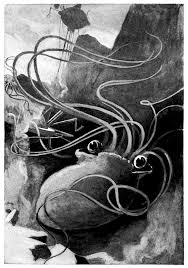
It is worthy of remark that a certain speculative writer... pointed out - writing in a foolish facetious tone - that the perfection of mechanical appliances must ultimately supersede limbs, the perfection of chemical devices, digestion - that such organs as hair, external nose, teeth, ears, chin, were no longer essential parts of the human being, and that the tendency of natural selection would lie in the direction of their steady diminution through the coming ages. The brain alone remained a cardinal necessity...
...To me it is quite credible that the Martians may be descended from beings not unlike ourselves...
Harlei: Yuck! So that's where we're headed...
Zendexor: Dr John Pollard experiences a preview of it...
Harlei: Pollard? Some time-traveller who goes into the future to sneak a look at evolved mankind, I presume.
Zendexor: Not at all. Pollard himself is The Man Who Evolved. He finds a way to "concentrate the cosmic rays and yet remove from them their harmful properties".
Stid: So?
Zendexor: So, since he's also figured out that it's the cosmic rays which cause evolutionary mutations, he decides to subject himself to a dose of them, and
"...go forward in hours or minutes through the evolutionary mutations that all mankind will go forward through in eons to come!"
Stid: But -
Zendexor: Yes, Stid, I know, the plan seems to by-pass the process of natural selection... but this is the sort of science fiction that doesn't have to follow scientific orthodoxy. Instead, it draws from the myth-building power of science.
"Pollard, give up this unholy business!" I cried, clutching his arm. "It's not too late..."
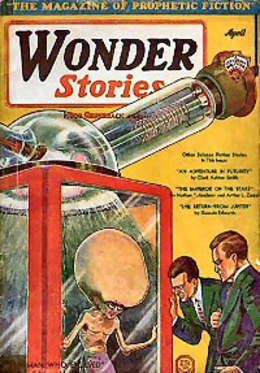
But of course it is too late. He can't back out, after making all the arrangements - so he goes ahead with it. Each fifteen-minute dose of the rays provides him with a fifty-million-year's worth of evolution. After a promising start, the metamorphoses become more sinister. We get a progression of larger and larger Brains atop increasingly puny torsos.
...the head supported by this weak body was an immense, bulging balloon that measured fully eighteen inches from brow to back! It was almost entirely hairless, its great mass balanced precariously...
"But Pollard, this is awful!" Dutton cried.
The eyes of the shrivelled, huge-headed figure in the cube fired with anger...
It gets worse. It turns out that one must not trifle with The Man Who Evolved. The only thing that saves the world from being dominated by the brain-monster is that the process goes so far that, well, as you may guess -
Stid: A law of diminishing returns becomes evident, I'll bet. And the secret, I'll also bet, dies with the inventor. Phew! That was close! But what if the Big Brain is supported by public policy? My turn to pick a tale. One of far superior awfulness.
forced brains
A human ovum had been carefully selected, fertilized in the laboratory, and largely reorganized by artificial means. By inhibiting the growth of the embryo's body, and the lower organs of the brain itself, and at the same time greatly stimulating the growth of the cerebral hemispheres, the dauntless experimenters succeeded at last in creating an organism which consisted of a brain twelve feet across, and a body most of which was reduced to a mere vestige upon the under-surface of the brain...
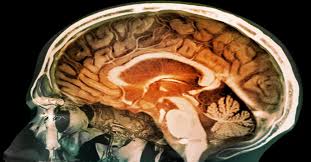
This one dies after four years - he "succumbed to his own brain weight and to certain failures in the chemical regulation of his blood".
But of course that didn't stop the Third Men (we're more than forty million years in the future now - in Part XI of Last And First Men) from their attempt to create the Fourth Men...
Harlei: Why did they bother?
Zendexor: Addicted to bio-engineering....
We may overlook the next four hundred years, during which sundry vain attempts were made to repeat the great experiment... Let us pass on to the first true individual of the fourth human species...
...His makers built a large circular 'brain turret' which they divided with many partitions, radiating from a central space, and covered everywhere with pigeon-holes. By a technique which took centuries to develop, they induced the cells of the growing embryonic brain to spread outwards, not as normal hemispheres of convolutions, but into the pigeon-holes which had been prepared for them...
Stid: That's the way to do it! No more flabby bulges.
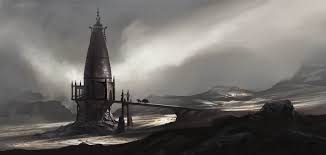
...At first he interested himself not at all in the affairs of the society which maintained him, served his every whim, and adored him. But in time he began to take pleasure in suggesting brilliant solutions of all the current problems of social organization. His advice was increasingly sought and accepted. He became autocrat of the state. His own intelligence and complete detachment combined with the people's superstitious reverence to establish him far more securely than any ordinary tyrant. He cared nothing for the petty troubles of his people, but he was determined to be served by a harmonious, healthy, and potent race. And as relaxation from the more serious excitement of research into physics and astronomy, the study of human nature was not without attractions. It may seem strange that one so completely devoid of human sympathy could have the tact to govern a race of the emotional Third Men. But he had built up for himself a very accurate behaviouristic psychology; and like the skilful master of animals, he knew unerringly how much could be expected of his people, even though their emotions were almost wholly foreign to him...
Stapledon goes on grippingly to describe how the Brain orders the creation of ten thousand others of his kind, to collaborate in research, and how discontent arises among the Third Men.
...Occasionally there were sparks of rebellion, but they always failed to kindle serious trouble; for the prestige and persuasiveness of the Fourth Men were irresistible.
At length, however, a crisis occurred. For some three thousand years the Fourth Men had pursued their research with constant success, but latterly progress had been slow... there was no prospect of opening up entirely new fields which might throw some light on the essential nature of things. Indeed, it began to dawn on them that they had scarcely plumbed a surface ripple of the ocean of mystery. Their knowledge seemed to them perfectly systematic, yet wholly enigmatic. They had a growing sense that though in a manner they knew almost everything, they really knew nothing.
The normal mind, when it experiences intellectual frustration, can seek recreation in companionship, or physical exercise, or art. But for the Fourth Men there was no such escape...

Harlei: Wow. Picture them, stuck in their towers...
Zendexor: Caring for nobody, not even for themselves except as "instruments of knowing"... sometimes sacrificing even their sanity to the "obsessive lust for intellection"... Pitiful monsters. What makes their rise and fall one of the most enthralling accounts in all literature, is the way the reader recognizes the inevitability, yet senses the immediacy, of each turn of fate. As predictable and yet as fresh as a new season.

The climax occurred in connection with a great revival of research, which, it was said, would break down the impalpable barriers and set knowledge in progress again. The Great Brains were to be multiplied a thousand fold, and the resources of the whole planet were to be devoted far more strictly than before to the crusade of intellection. The menial Third Men would therefore have to put up with more work and less leisure...
Matters came to a head when the tyrants announced that all useless animals must be slaughtered, since their upkeep was too great an economic burden upon the world-community...
Warfare ensues, which the Brains win with the aid of a specially bred strain of suggestible servitors.
Stid: I remember: now comes the time of greatest horror.
Zendexor: Yes, what one might call the devil-time.
...though the Great Brains were now absolute masters of the Earth, they were after all no nearer their goal than before. The actual struggle with the natural species had provided them with an aim; but now that the struggle was over, they began to be obsessed once more with their intellectual failure...
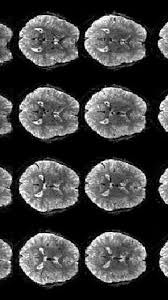
...Evidently something more than mere bulk of brain was needed for the solving of the deeper intellectual problems. They must, therefore, somehow create a new brain-quality, or organic formation of brain, capable of a mode of vision or insight impossible in their present state. They must learn somehow to remake their own brain-tissues upon a new plan. With this aim, and partly through unwitting jealousy of the natural and more balanced species which had created them, they began to use their captive specimens of that species for a great new enterprise of research into the nature of human brain-tissue... The unfortunate specimens were therefore submitted to a thousand ingenious physiological and psychological tortures. Some of them were kept alive with their brains spread out permanently on a laboratory table...
The research continued for some thousands of years, but gradually slackened, so utterly barren did it prove to be. As this frustration became more and more evident, a change began to come over the minds of the Fourth Men.
Here we have the equivalent surprise to Wells' understanding of our potential evolutionary kinship with the Martians. In the case of Stapledon's Fourth Men, it is the realization that they are not fiends, despite the terrible deeds they performed. In fact, at the last, they even show a kind of nobility, in their unsparing honesty:
Little by little the Fourth Men began to realize that what was wrong with themselves was not merely their intellectual limitation, but, far more seriously, the limitation of their insight into values. And this weakness, they saw, was the result, not of paucity of intellective brain, but of paucity of body and lower brain tissues. This defect they could not remedy. It was obviously impossible to remake themselves so radically that they should become of a more normal type. Should they concentrate their efforts upon the production of new individuals more harmonious than themselves? Such a work, it might be supposed, would have seemed unattractive to them. But no. They argued thus. 'It is our nature to care most for knowing. Full knowledge is to be attained only by minds both more penetrating and more broadly based than ours. Let us, therefore, waste no more time in seeking to achieve the goal in ourselves. Let us seek rather to produce a kind of being, free from our limitations, in whom we may attain the goal of perfect knowledge vicariously. The producing of such a being will exercise all our powers, and will afford the highest kind of fulfilment possible to us. To refrain from this work would be irrational.'
And so the Fourth Men eventually produce the Fifth Men - their supplanters.
severed brains
But now let's draw back from this remote far future and consider what's been written about hyper-brains in our own day and age. Contemporary, that is, with the author who is writing about them shortly after the end of World War Two.
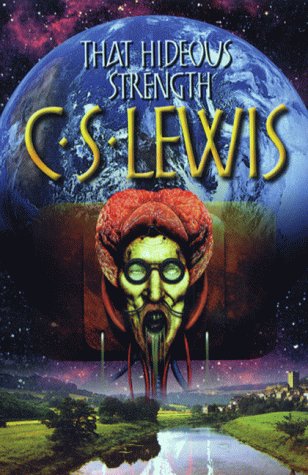
An authoritarian institution is taking over the country and performing macabre experiments. The nature of these experiments is as yet unclear to the resistance movement - until a psychic, who learns in a dream what is being done, gives a report:
"I dreamed I was in a dark room... with queer smells in it and a sort of low humming noise. Then the light came on - but not very much light, and for a long time I didn't realise what I was looking at. And when I made it out...I should have waked up if I hadn't made a great effort not to. I thought I saw a face floating just in front of me. A face, not a head, if you understand what I mean. That is, there was a beard and nose and eyes - at least, you couldn't see the eyes because it had coloured glasses on, but there didn't seem to be anything above the eyes. Not at first. But as I got used to the light, I got a horrible shock. I thought the face was a mask tied on to a kind of balloon thing. But it wasn't, exactly. Perhaps it looked a bit like a man wearing a sort of turban... I'm telling this dreadfully badly. What it really was, was a head (the rest of a head) which had had the top part of the skull taken off and then... then... as if something inside had boiled over. A great big mass which bulged out from inside what was left of the skull. Wrapped in some kind of composition stuff, but very thin stuff. You could see it twitch. Even in my fright I remember thinking, 'Oh, kill it, kill it. Put it out of its pain.' But only for a second, because I thought the thing was dead, really. It was green looking and the mouth was wide open and quite dry. You realise I was a long time, looking at it, before anything else happened. And soon I saw that it wasn't exactly floating. It was fixed up on some kind of bracket, or shelf, or pedestal - I don't know quite what, and there were things hanging from it. From the neck, I mean. Yes, it had a neck and a sort of collar thing round it, but nothing below the collar: no shoulders or body. Only these hanging things. In the dream I thought it was some kind of new man that had only head and entrails: I thought all those tubes were its insides. But presently - I don't quite know how, I saw that they were artificial. Little rubber tubes and bulbs and little metal things too. I couldn't understand them. All the tubes went into the wall. Then at last something happened..." [That Hideous Strength, p.220-1]
Stid: Puts the Fourth Men into perspective. They were bad enough, but there was something more to them than pure horror. Whereas the 'Head' of the National Institute for Co-ordinated Experiments - the involuntary donation of a Dr Alcasan who was guillotined - well, we're not given any insight into its mode of consciousness. Perhaps it doesn't have one.
Zendexor: Perhaps. The question is left unanswered, which enhances the impact.
The weak-willed Mark Studdock, falling deeper and deeper into the NICE's clutches, learns of the true situation from the initiate Frost.
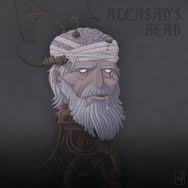
"...I must begin by telling you that neither the Deputy Director, nor I, are responsible for shaping the policy of the Institute."
"The Head?" said Mark.
"No. Filostrato and Wilkins are quite deceived about the Head. They have, indeed, carried out a remarkable experiment by preserving it from decay. But Alcasan's mind is not the mind we are in contact with when the Head speaks."
"Do you mean Alcasan is really...dead?" asked Mark. His surprise at Frost's last statement needed no acting.
"In the present state of our knowledge," said Frost, "there is no answer to that question. Probably it has no meaning. But the cortex and vocal organs in Alcasan's head are used by a different mind. And now, please, attend very carefully. You have probably not heard of macrobes."
"Microbes?" said Mark in bewilderment. "But of course - "
"I did not say microbes, I said macrobes..." [ibid., p314-5. Click for more on the macrobes.]
So poor old Alcasan is not only reduced to being a head on a bracket, but he can't even express himself - he is a mere mouthpiece. But the reader is left in no doubt that in any case the kind of experiment which produced the 'Head' would still have been an abomination even if Alcasan's brain had been properly implanted in some artificial structure so as to create a cyborg.
A vastly different view is presented in Becalmed in Hell.
Here the "hell" is not brought into being by the evil in man; it is merely the inhospitable environment of the planet Venus. And the cyborg is on friendly terms with his crew. Crew? Yes - Eric the cyborg is a spaceship pilot who is also the spaceship. The partnership between sentient ship and crew seems healthy enough.
Only, his crew of one gets worried when the moment comes to leave Venus and nothing happens.
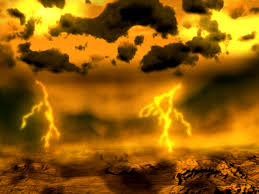
..."What's the trouble, Eric?"
"You'd rather not know."
He meant it. His voice was a mechanical, inhuman monotone; he wasn't making the extra effort to get human expression out of his 'prosthetic' vocal apparatus. Only a severe shock would affect him that way.
"I can take it," I said.
"Okay. I can't feel anything in the ramjet controls. Feels like I've just had a spinal anesthetic."
And so the tension begins. Of course the atmosphere of the tale is far from the horror of Alcasan and the NICE, but still, if your life depends on the suddenly doubtful sanity of a cyborg, little bubbles of unease are bound to prickle your insides... especially if the temperature and pressure outside the hull of your ship are hellishly high.
Stid: And these harsh conditions exist because this is the modern, post-Mariner-2 Venus. So, Zendexor, what are you up to, putting this stuff on this page, on this site which is supposed to be about the Old Solar System? Eh?
Zendexor: Caught me out there, haven't you - yes, Becalmed in Hell is not OSS. In fact it's very effective NSS.
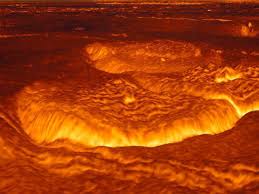
It was almost like being under water. My headlamp beam went out thick enough to be solid, penetrating no more than a hundred feet. The air couldn't have been that opaque, no matter how dense. It must have been full of dust, or tiny droplets of some fluid...
The ground turned out to be a dry, reddish dirt, crumbly, and so porous that it was almost spongy. Lava etched by chemicals? Almost anything would be corrosive at this pressure and temperature...
Harlei: I suppose you start to think, there's bound to be a price to pay, trusting your life to a cyborg under such circumstances... and the cyborg idea is so colourful, pulling the story towards OSS drama...
Zendexor:
Thanks, Harlei, for trying to find excuses to fit the story into an OSS
site. Truth of the matter is, I just forgot that it plainly wasn't
OSS, I got carried away because it is such a good tale and this page is,
after all, a good home for a severed Brain... It would have been a
pity not to include Eric among his sinister fellows.
Harlei: But it's just as well, I see now, that you didn't title this page "Evil Brains". Eric isn't evil.
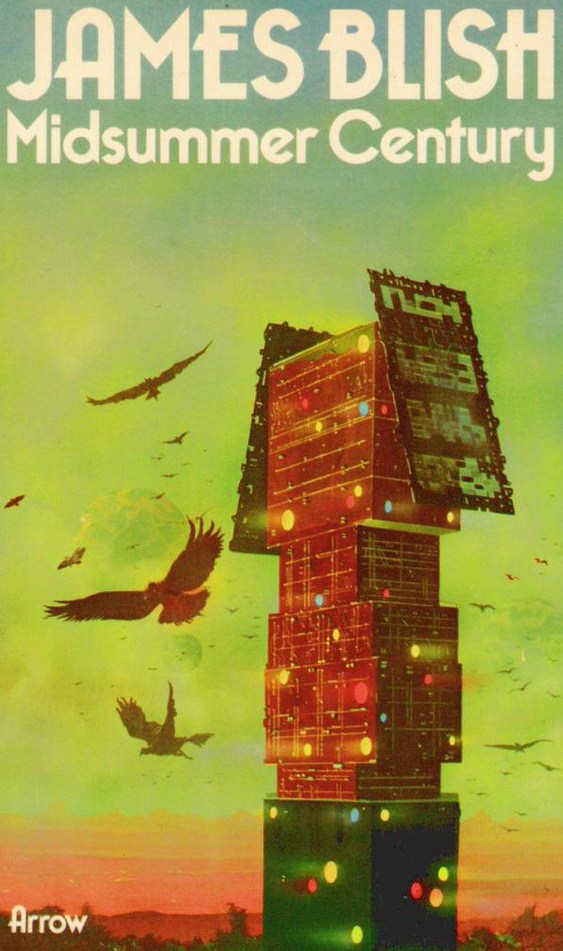
Zendexor: Judgement is harder to reach in the case of the Qvant. We're ahead in the future again now - in about 25,000 AD. The Qvant is a brain in a box, of some sort. A mighty brain - that of the 'Autocrat of Rebirth III' - but a retired autocrat, it seems, whose brain case stands in a museum and is visited only occasionally by petitioners from the local tribe of what's left of civilization.
Midsummer Century is a short novel, hardly 100 pages. It is packed with unforgettable imagery.
The consciousness of a twentieth-century man named Martels has been thrown by some accident 23,000 years into the future and lodged in the brain-case of the Qvant. The Qvant is ruthless and grumpy towards this intruder, trying more than once to eject him into the void, but now and then he is moderately communicative. Both traits become rarer as a kind of lethargy sets in. While Martels longs ever more desperately for a way of escape, we get an insight into the problems of being a disembodied brain:
...for most of the time, Martels had to stare at the same spot on the far wall and listen to the same meaningless echoes.
The midsummer century wore on. A year went by. The petitioners became fewer and fewer. Even Qvant seemed to be suffering some kind of erosion, despite his interior resources: sinking, indeed, into some sort of somnambulistic reverie which was quite different from his previous state of constant interior speculation. Martels could no more overhear Qvant's thoughts than before, but their tone had changed; at the beginning, there had been an impression of leisurely, indeed almost sybaritic, but constant, meditation and speculation, but now all that came through was a sort of drone, like a dull and repetitive dream which could not be gotten beyond a certain point, and from which it was impossible to awaken...
Harlei: This is interesting, I admit, but now let's be done with all this subtlety and get back to some plainly villainous hyper-brains. I vote we finish off with the evil Martian bulgies in Red Moon.
The brain that Bregge served was black-veined and enormous. It was one of the great leader Martians - a pulsating, livid enormity that lay in disgusting inertness on a stone slab.
It looked like an enormous leech in the diffused emerald light. Glistening, leathery, it was spread out irregularly over the stone. So smooth was the membrane covering it, that it seemed almost featureless. The motor areas were encircled by crimson cilia, which quivered horribly with every pulsation of its repulsive, slumberous bulk.
Its one lidless eye stared steadily at Bregge and the sear-blade in his hand. It stared steadily, but without apprehension or anger. The facets of the eye absorbed the image of Bregge standing there... Although the Martian was nine-tenths asleep, it stirred and quivered a little with dull, pervasive vexation. Obscurely it knew that its privacy had been violated...
Stid: I get the distinct impression that we're not meant to like this creature.
Zendexor: I also detect some anti-Martian authorial bias here. Let's make amends for it, by giving a vote of thanks to all those bulgy horrors who have enriched our fund of good stories.
James Blish, Midsummer Century (1972); Edmond Hamilton, "The Man Who Evolved" (Wonder Stories, April 1931); C S Lewis, That Hideous Strength (1945); Frank Belknap Long, "Red Moon" (Thrilling Wonder Stories, June 1940); Larry Niven, "Becalmed in Hell" (The Magazine of Fantasy and Science Fiction, July 1965); Olaf Stapledon, Last And First Men (1930); Donald Wandrei, "The Red Brain" (Weird Tales, October 1927); H G Wells, The War of the Worlds (1898); Jack Williamson, "The Plutonian Terror" (Weird Tales, October 1933)
For the Selenite hyper-brains in Wells' The First Men in the Moon, and how they differ from the same author's Martians, see the OSS Diary, 30th January 2017.
For more on Red Moon see the OSS Diary, 12th March 2017.
› Hyper-Brains










































